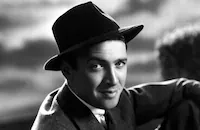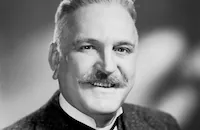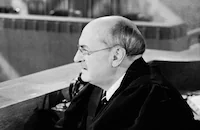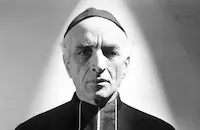The Mortal Storm

Brief Synopsis
Cast & Crew
Frank Borzage
Margaret Sullavan
James Stewart
Robert Young
Frank Morgan
Robert Stack
Film Details
Technical Specs

Synopsis
In a small German university town in 1933, a birthday celebration for Professor Viktor Roth is interrupted by the news that Hitler has been appointed chancellor. Roth, who is non-Aryan, his daughter Freya, and Martin Breitner, a family friend who loves Freya, are apprehensive about Hitler's rise, but Roth's stepsons, Otto and Erich Von Rohn, and Fritz Marberg, Freya's new fiancé, are enthusiastic. The town's Nazis soon begin to inflict violence on their ideological adversaries and on non-Aryans, and Roth's stepsons leave his house. Freya breaks with Fritz and comes to return Martin's love, but the lovers are separated when Martin, who has helped a non-Aryan friend leave the country, is stranded in Austria. For refusing to acknowledge a difference between Aryan and non-Aryan blood, Roth loses his teaching position and is interned in a concentration camp, and his family's frantic efforts to locate him result only in a brief visit before his mysterious death. On their way to Austria, Freya and Mrs. Roth are detained for carrying Roth's manuscript, and Freya is forced to stay in Germany indefinitely. Martin, however, returns for Freya and as the couple make their way through a difficult mountain pass, they are in sight of Austria when a Nazi patrol, led by Fritz, locates them. The lovers reach the border, but Freya dies shortly after from a gunshot wound incurred during the chase.

Director

Frank Borzage
Cast

Margaret Sullavan

James Stewart

Robert Young

Frank Morgan

Robert Stack

Bonita Granville

Irene Rich

William T. Orr

Maria Ouspenskaya

Gene Reynolds

Russell Hicks
William Edmunds
Esther Dale

Dan Dailey Jr.

Granville Bates
Thomas Ross

Ward Bond
Sue Moore
Harry Depp
Julius Tannen
Gus Glassmire
Dick Rich
Ted Oliver
Lucien Prival
Dick Elliott
Henry Victor
John Stark
William Irving
Bert Roach
Bob Stevenson

Max Davidson

Fritz Leiber
Davis Roberts
Howard Lang
Bodil Rosing
Crew
Adrian
Frank Borzage
Lew Borzage
Jack Dawn
Anderson Ellis
George Froeschel
Cedric Gibbons
Dr. O. S. Greeley
Sydney Guilaroff
Edward Kane
Lloyd Knechtel
Sandy Roth
Wade B. Rubottom
Douglas Shearer
Al Shenberg
Leonard Smith
Gile Steele
Walter Strohm
John Taggart
Elmo Vernon
Claudine West
Edwin B. Willis
Dolph Zimmer

Photo Collections
Videos
Movie Clip



Trailer
Hosted Intro
Film Details
Technical Specs

Articles
The Mortal Storm
Professor Roth (Frank Morgan) is a "non-Aryan" (MGM's circumlocution for Jew) teaching medicine in a Bavarian university. The Mortal Storm opens as Hitler becomes Chancellor, but Roth believes he is safe because he is non-political, a scholar. Roth's two stepsons join the Nazis, as does Fritz (Robert Young), who is engaged to Roth's daughter, Freya, (Margaret Sullavan). Repelled by what's happening, Freya turns to pacifist Martin (James Stewart) as her family is torn apart by the Nazis.
Stewart and Sullavan had been friends for years, and The Mortal Storm was their fourth and final film together. Sullavan was high-strung and could be temperamental, which made things difficult on the set. But the easygoing Stewart found her unpredictability charming, understood her moods, and knew how to get around them. Yes, she was difficult, but he thought the results were worth it. "She had you just a little bit off guard...she could do moments that would hit you, maybe a look or a line or two, but they would hit like flashes or earthquakes."
The rest of the large cast, made up of veterans like Morgan, Young, and Irene Rich, along with some talented newcomers, was equally strong. The Mortal Storm was the second film for Robert Stack, who was impressive in the pivotal role of the stepson whose family tragedy leads him to question his commitment to Nazism. This was the film debut of Dan Dailey (billed as "Dan Dailey, Jr.") who had been a vaudeville and Broadway song-and-dance man, and would go on to have a major career in movie musicals. In The Mortal Storm, however, Dailey is chilling in a dramatic role as a rabid Nazi ideologue.
By the time The Mortal Storm opened in the summer of 1940, all of Europe was at war. What had seemed prescient in the 1930's was grim reality by 1940. In spite of fine acting and the sensitive direction of Frank Borzage, many critics found the film dated, its subject grim and depressing. Howard Barnes' review in the New York Herald Tribune was typical: "less than a year ago, it would have had far more dramatic and emotional impact than it has at this time....It is not MGM's fault, but the timing on the making of The Mortal Storm has been extremely bad." The film was a failure at the box office.
American critics and audiences weren't the only ones who didn't like The Mortal Storm. Its powerful anti-Nazi message led Hitler's propaganda minister Joseph Goebbels to shut down the Berlin office of MGM's parent company, Loew's, and to ban the showing of all MGM films in German territories. The flood of anti-fascist American films had begun, and a year and a half later, the U.S. entered the war.
Director: Frank Borzage
Producer: Sidney Franklin, Victor Saville (uncredited)
Screenplay: Claudine West, Andersen Ellis, George Froeschel, based on the novel by Phyllis Bottome
Editor: Elmo Veron
Cinematography: William Daniels
Costume Design: Adrian, Gile Steele
Art Direction: Cedric Gibbons, Wade Rubottom; set designer Edwin B. Willis
Music: Edward Kane, Eugene Zador
Principal Cast: Margaret Sullavan (Freya Roth), James Stewart (Martin Breitner), Robert Young (Fritz Marlberg), Frank Morgan (Prof. Roth), Robert Stack (Otto von Roth), Bonita Granville (Elsa), Irene Rich (Mrs. Roth), William T. Orr (Erich von Rohn), Maria Ouspenskaya (Mrs. Breitner), Gene Reynolds (Rudi), Dan Dailey, Jr. (Holl)
BW-101m. Closed captioning.
By Margarita Landazuri

The Mortal Storm
Robert Stack, 1919-2003
Stack was born in Los Angeles on January 13, 1919 to a well-to-do family but his parents divorced when he was a year old. At age three, he moved with his mother to Paris, where she studied singing. They returned to Los Angeles when he was seven, by then French was his native language and was not taught English until he started schooling.
Naturally athletic, Stack was still in high school when he became a national skeet-shooting champion and top-flight polo player. He soon was giving lessons on shooting to such top Hollywood luminaries as Clark Gable and Carol Lombard, and found himself on the polo field with some notable movie moguls like Darryl Zanuck and Walter Wanger.
Stack enrolled in the University of Southern California, where he took some drama courses, and was on the Polo team, but it wasn't long before some influential people in the film industry took notice of his classic good looks, and lithe physique. Soon, his Hollywood connections got him on a film set at Paramount, a screen test, and eventually, his first lead in a picture, opposite Deanna Durbin in First Love (1939). Although he was only 20, Stack's natural delivery and boyish charm made him a natural for the screen.
His range grew with some meatier parts in the next few years, especially noteworthy were his roles as the young Nazi sympathizer in Frank Borzage's chilling The Mortal Storm (1940), with James Stewart, and as the Polish flier who woos a married Carole Lombard in Ernst Lubitsch's To Be or Not to Be (1942).
After serving as a gunnery officer in the Navy during World War II, Stack returned to the screen, and found a few interesting roles over the next ten years: giving Elizabeth Taylor her first screen kiss in Robert Thorp's A Date With Judy (1948); the leading role as an American bullfighter in Budd Boetticher's The Bullfighter and the Lady (1951); and as a pilot in William Wellman's The High and the Mighty (1954), starring John Wayne. However, Stack saved his best dramatic performances for Douglas Sirk in two knockout films: as a self-destructive alcoholic in Douglas Sirk's Written on the Wind (1956), for which he received an Academy Award nomination for supporting actor; and sympathetically portraying a fallen World War I pilot ace who is forced to do barnstorming stunts for mere survival in Tarnished Angels (1958).
Despite proving his capabilities as a solid actor in these roles, front rank stardom oddly eluded Stack at this point. That all changed when Stack gave television a try. The result was the enormously popular series, The Untouchables (1959-63). This exciting crime show about the real-life Prohibition-era crime-fighter Eliot Ness and his G-men taking on the Chicago underworld was successful in its day for several reasons: its catchy theme music, florid violence (which caused quite a sensation in its day), taut narration by Walter Winchell, and of course, Stack's trademark staccato delivery and strong presence. It all proved so popular that the series ran for four years, earned an Emmy for Stack in 1960, and made him a household name.
Stack would return to television in the late '60s, with the The Name of the Game (1968-71), and a string of made-for-television movies throughout the '70s. His career perked up again when Steven Spielberg cast him in his big budget comedy 1941 (1979) as General Joe Stillwell. The film surprised many viewers as few realized Stack was willing to spoof his granite-faced stoicism, but it won him over many new fans, and his dead-pan intensity would be used to perfect comic effect the following year as Captain Rex Kramer (who can forget the sight of him beating up Hare Krishnas at the airport?) in David and Jerry Zucker's wonderful spoof of disaster flicks, Airplane! (1980).
Stack's activity would be sporadic throughout the remainder of his career, but he returned to television, as the host of enormously popular Unsolved Mysteries (1987-2002), and played himself in Lawrence Kasden's comedy-drama Mumford (1999). He is survived by his wife of 47 years, Rosemarie Bowe Stack, a former actress, and two children, Elizabeth and Charles, both of Los Angeles.
by Michael T. Toole
Robert Stack, 1919-2003
Quotes
Trivia
Notes
According to a news item in Hollywood Reporter, Judith Anderson and Scotty Beckett were originally cast as Mrs. Roth and one of her sons, but were replaced because they were unsuited for the roles. Additional news items in Hollywood Reporter state that the special mountain snow scenes were filmed at Salt Lake City, UT by Leonard Smith and Lloyd Knechtel and that other scenes were shot at Sun Valley, ID. Modern sources credit Richard Rosson with the second unit direction in Sun Valley. In August 1940, a Hollywood Reporter article reported that writer Al Rosen filed a lawsuit against Loew's, Frank Borzage, Claudine West, Anderson Ellis and George Froeschel, among others, for incorporating the plot of his novel Mad Dog of Europe into The Mortal Storm. Hollywood Reporter added in March 1943 that he was still seeking an injunction, damages and impounding of the film, but the outcome of the case has not been determined. An unidentified contemporary source contained in the Production Files at the AMPAS Library noted an unconfirmed report that the Nazis banned all M-G-M films because of this film. The film was included in Film Daily 's "ten best" list for 1940. Hollywood Reporter reported in April 1942 that The Mortal Storm was the first anti-Nazi film to run in Brazil, where it broke box-office attendance records.
A modern source credits Victor Saville as producer and indicates that Saville refused onscreen credit because he was British and did not want to be accused of inciting America to war. According to an article in Los Angeles Examiner on September 10, 1941, Senator Gerald P. Nye wanted to summon Saville to testitfy before a sub-committee investigating "British agents operating in the film industry." In the modern article, Saville claims that he directed parts of the film; however, another modern source, that includes interviews with James Stewart, Robert Stack and Gene Reynolds, indicates that those actors refute Saville's claim that he worked as a director on the film. Modern sources credit Henry S. Noerdlinger as technical director and Bronislau Kaper with additional music for the film. A few scenes from the film were included in the 1992 Twentieth Century-Fox picture Shining Through, directed by David Seltzer, and starring Michael Douglas and Melanie Griffith

















